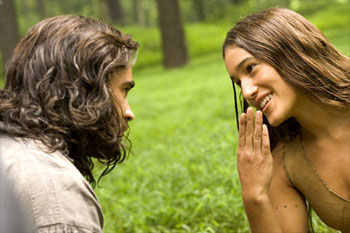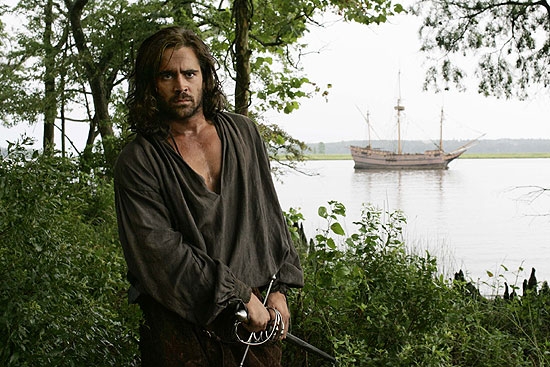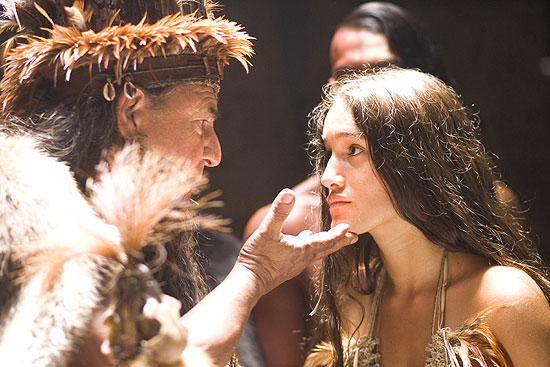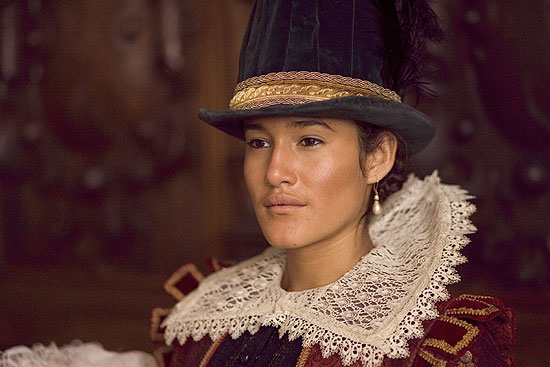“I’ve been waiting for this day my whole life, this day of reckoning.” Some choice offerings from the rest of the Watchmen trailer bin, which are now online: Harry digs deep into the memory hole to Anakin up He-Who Must-Not-Be-Named in the second preview for David Yates’ Harry Potter and the Half-Blood Prince. (To be honest, I think I might’ve missed the first trailer from last November (at the same link) — that one’s not bad either.) Iowan ne’er-do-well James Tiberius Kirk straightens up and flies right in a preview for J.J. Abrams’ Star Trek of epic scope. Hugh Jackman dons the claws once more in another look at Gavin Hood’s X-Men Origins: Wolverine. (Meh, bub.) And an animated Ed Asner braves floating houses, boy scouts, and talking dogs in the newest trailer for Pixar’s UP. Pixar will go wrong someday — this doesn’t look to be it.
Tag: David Thewlis
Riddle in the Dark.
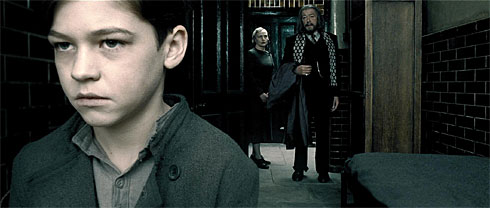
In anticipation of the HP & The Half-Blood Prince trailer, which should be on later tonight, USA Today scores two stills from the forthcoming sixth Potter film, including this one of young Tom Riddle looking Omen-ish. (Conveniently, he’s played by Hero Fiennes-Tiffin, Ralph Fiennes’ nephew.)
Update: “I can make things move without touching them. I can make bad things happen to people who are mean to me. I can speak to snakes too. They find me, whisper things…” And here it is. (Link sent via Raza.)
The Dark is Rising.
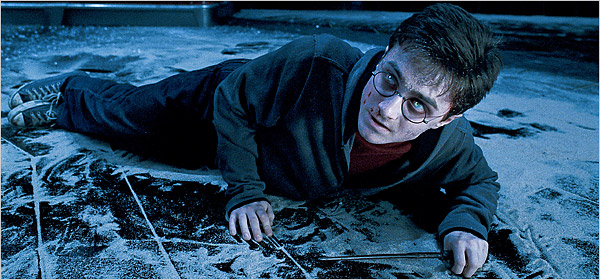
Harry Potter and the Order of the Phoenix, director David Yates’ take on the fifth installment of J.K. Rowling’s (soon-to-be-completed!) series, is, I’m happy to report, a somber, suspenseful return to the increasingly dire matters at Hogwarts, and well in keeping with the higher standard set by Alfonso Cuaron and Mike Newell in the past two movies. While I think Newell’s Goblet of Fire remains my favorite film outing thus far, this one is right up there in my estimation, and given how much less Yates had to work with, that’s rather impressive. (For all its girth, Book V felt basically like a holding action to me — the wider narrative arc didn’t progress all that much from the end of Goblet to the end of Order, and the story suffered from a wham-bang action climax that didn’t really work on paper (it comes off better on-screen.)) Indeed, Yates’ Order not only captures my most prominent impressions of the book — Harry’s burgeoning teenage moodiness, the growing sense among the students of grim times ahead and important events already set in motion — but also significantly streamlines and distills Rowling’s most-sprawling tome into two-and-a-half hours of sleek, well-paced cinema. No mean feat of magic, that.
By the start of Order, Voldemort (Ralph Fiennes) is loose, Cedric Diggory is dead, and Harry Potter (Daniel Radcliffe), once more at the mercy of the Dursleys for the summer, is poised on the verge of adolescent rebellion. He hasn’t heard a pip from friends Ron (Rupert Grint) and Hermione (Emma Watson) for months, nor has he heard any news of goings-on in the magical world. So it is with no small amount of surprise and consternation that Harry finds himself first attacked by Dementors one gloomy evening, then expelled from Hogwarts — by authority of the Ministry of Magic — for using his wand to defend himself. Brought back into the magical loop by these events, Harry discovers that many of his former allies, including godfather Sirius Black (Gary Oldman), have banded together to re-form the Order of the Phoenix in preparation for Lord Voldemort’s next move. More troubling, it seems Minister of Magic Cornelius Fudge (Robert Hardy) is not only not inclined to believe Harry that You-Know-Who has returned, but also views Harry and his mentor Albus Dumbledore (Michael Gambon), as a political threat, and has turned the general public and popular press against them both. Finally, to further complicate Potter’s prospects, Fudge dispatches one Dolores Umbridge (Imelda Staunton) to Hogwarts with a ministry mandate to stamp out both dark sarcasm and Defense against the Dark Arts in the classroom. Thus hemmed in, Harry, Ron, and Hermione find once more they need to take matters in their own hands, and begin to defiantly assemble what they call Dumbledore’s Army, a student organization dedicated to preparing for the worst. But, all the while, Lord Voldemort is up to his own tricks…and what good is Dumbledore’s Army if its young, bespectacled leader is already hopelessly compromised by his still-unexplained connection to the Dark Lord?
As the paragraph above attests, there’re a lot of balls in the air this time around, but Yates, screenwriter Michael Goldenberg, & co. do a solid job of keeping everything moving without doing grievous harm to any of the many included subplots. (Several have been excised regardless, such as this year’s Quidditch match. No real loss, imho.) And throughout, what Order of the Phoenix gets most right — in fact, one could argue it’s actually done better here than in the book — is the feeling that things are simmering to a boil. Hermione, Ron, and especially Harry have grown from wide-eyed, trusting children to gawky, hormonal teenagers (and better actors, for that matter), seething with imminent rebellion against the powers-that-be, and their world has similarly gone from a colorful, fantastic, and ever-so-occasionally dangerous realm of magical delights to a gray, ominous land of hidden agendas, political propaganda, fallible adults, and fatal consequences. In the last movie, Harry’s Hogwarts cohort were on the threshold of early adolescence, and had just begun to discover the tantalizing mysteries of the opposite sex. Here, slightly older, they come to another classic teenage rite-of-passage: finding that the world — and, more often that not, the people in charge — aren’t all they’re cracked up to be, and that they may even actually be out to get you.
Of course, Yates is helped out tremendously in bringing Order to life by his ever-expanding Dream Team of British thespians. Imelda Staunton, as the main new cast member, is note-perfect as Umbridge. A pink-festooned, unholy cross between the Church Lady and arguably the real You-Know-Who of Rowling’s books, Margaret Thatcher, she’s like something out of a Roger Waters fever dream (and continues the “The Tories are Coming!” subtext I noted in my review of the last movie.) Even with Staunton aside, tho’, Order is packed to the brim with quality actors reprising their roles from the first four films — Oldman, Hardy, Brendan Gleeson, Maggie Smith, Michael Gambon, Emma Thompson, Jason Isaacs, Robbie Coltrane, etc., and particularly Fiennes and Alan Rickman. They’re all excellent, and frankly it’s good fun just to see so many of them around again to help further flesh out the Potterverse. (Although, having seen Naked and The History Boys since Goblet, I’m slightly more concerned about Harry hanging around the likes of Remus Lupin (David Thewlis) and Vernon Dursley (Richard Griffiths)…what would the Umbridges of the world have to say about that?)
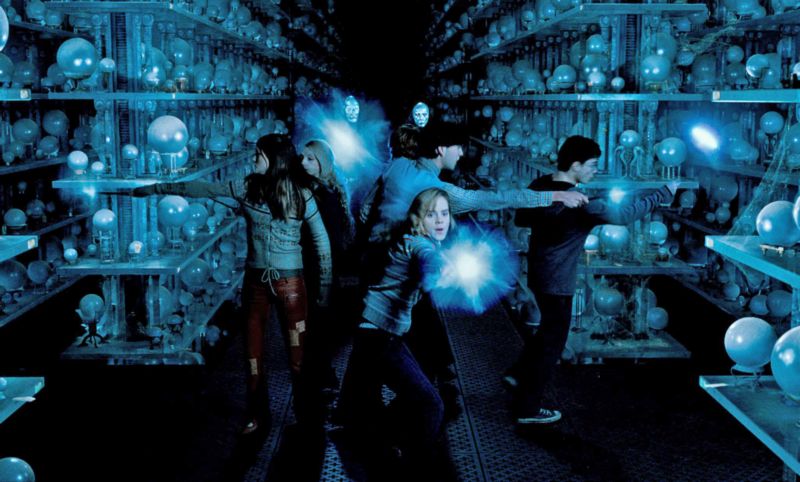
2006 (Finally) in Film.
Well, there are still a number of flicks I haven’t yet seen — David Lynch’s Inland Empire, for example, which I hope to hit up this weekend. But as the Oscar nods were announced today, and as the few remaining forlorn Christmas trees are finally being picked up off the sidewalk, now seems the last appropriate time to crank out my much belated end-of-2006 film list (originally put off to give me time to make up for my New Zealand sojourn.) To be honest, I might’ve written this list a few weeks earlier, had it not happened that I ended up seeing the best film of 2005 in mid-January of last year, thus rendering the 2005 list almost immediately obsolescent. But, we’ll get to that — As it stands, 2006 was a decent year in movies (in fact a better year in film than it was in life, the midterms notwithstanding), with a crop of memorable genre flicks and a few surprisingly worthy comebacks. And, for what it’s worth, I thought the best film released in 2006 was…
[2000/2001/2002/2003/2004/2005]
1. United 93: A movie I originally had no interest in seeing, Paul Greengrass’s harrowing docudrama of the fourth flight on September 11 captured the visceral shock of that dark day without once veering into exploitation or sentimentality (the latter the curse of Oliver Stone’s much inferior World Trade Center.) While 9/11 films of the future might offer more perspective on the origins and politics of those horrible hours, it’s hard to imagine a more gripping or humane film emerging anytime soon about the day’s immediate events. A tragic triumph, United 93 is an unforgettable piece of filmmaking.
[1.] The New World (2005): A movie which seemed to divide audiences strongly, Terence Malick’s The New World was, to my mind, a masterpiece. I found it transporting in ways films seldom are these days, and Jamestown a much richer canvas for Malick’s unique gifts than, say, Guadalcanal. As the director’s best reimagining yet of the fall of Eden, The New World marvelously captured the stark beauty and sublime strangeness of two worlds — be they empires, enemies, or lovers — colliding, before any middle ground can be established. For its languid images of Virginia woodlands as much as moments like Wes Studi awestruck by the rigid dominion over nature inherent in English gardens, The New World goes down as a much-overlooked cinematic marvel, and (sorry, Syriana) the best film of 2005.
2. Letters from Iwo Jima: Having thought less of Flags of our Fathers and the woeful Million Dollar Baby than most people, I was almost completely thrown by the dismal grandeur and relentless gloom of Eastwood’s work here. To some extent the Unforgiven of war movies, Iwo Jima is a bleakly rendered siege film that trafficks in few of the usual tropes of the genre. (Don’t worry — I suspect we’ll get those in spades in two months in 300.) Instead of glorious Alamo-style platitudes, we’re left only with the sight of young men — all avowed enemies of America, no less — swallowed up and crushed in the maelstrom of modern combat. From Ken Watanabe’s commanding performance as a captain going down with the ship to Eastwood’s melancholy score, Letters works to reveal one fundamental, haunting truth: Tyrants may be toppled, nations may be liberated, and Pvt. Ryans may be saved, but even “good wars” are ultimately Hell on earth for those expected to do the fighting.
3. Children of Men: In the weeks since I first saw this film, my irritation with the last fifteen minutes or so has diminished, and Alfonso Cuaron’s Children of Men has emerged for what it is — one of the most resonant “near-future” dystopias to come down the pike in a very long while, perhaps since (the still significantly better) Brazil. Crammed with excellent performances by Clive Owen, Michael Caine, Chiwetel Ejiofor and others, Children is perhaps a loosely-connected grab bag of contemporary anxieties and afflictions (terrorism, detainment camps, pharmaceutical ads, celebrity culture). But it’s assuredly an effective one, with some of the most memorable and naturalistic combat footage seen in several years to boot. I just wished they’d called that ship something else…
4. Borat: Cultural Learnings of America for Make Benefit Glorious Nation of Kazakhstan: True, the frighteningly talented Sasha Baron Cohen spends a lot of time in this movie shooting fish in a barrel, and I wish he’d spent a little more time eviscerating subtler flaws in the American character than just knuckle-dragging racists and fratboy sexists. Still, the journeys of Borat Sagdiyev through the Bible Buckle and beyond made for far and away the funniest movie of the year. Verry nice.
5. The Prestige: I originally had this in Children of Men‘s spot, as there are few films I enjoyed as much this year as Christopher Nolan’s sinister sleight-of hand. But, even after bouncing Children up for degree of difficulty, that should take nothing away from The Prestige, a seamlessly made genre film about the rivalries and perils of turn-of-the-century prestidigitation. (There seems to be a back-and-forth between fans of this film and The Illusionist, which I sorta saw on a plane in December. Without sound (which, obviously, is no way to see a movie), Illusionist seemed like an implausible love story set to a tempo of anguished Paul Giamatti reaction shots. In any case, I prefer my magic shows dark and with a twist.) Throw in extended cameos by David Bowie and Andy Serkis — both of which help to mitigate the Johansson factor — and The Prestige was the purest cinematic treat this year for the fanboy nation. Christian Bale in particular does top-notch work here, and I’m very much looking forward to he and Nolan’s run-in with Heath Ledger’s Joker in The Dark Knight.
6. The Fountain: Darren Aronofsky’s elegiac ode to mortality and devotion was perhaps the most unfairly maligned movie of the year. (In a perfect world, roughly half of the extravagant praise going to Guillermo del Toro’s Pan’s Labyrinth would have been lavished on this film.) Clearly a heartfelt and deeply personal labor of love, The Fountain — admittedly clunky in his first half hour — was a visually memorable tone poem that reminds us that all things — perhaps especially the most beautiful — are finite, so treasure them while you can.
7. The Queen: A movie I shied away from when it first came out, The Queen is a canny look at contemporary politics anchored by Helen Mirren’s sterling performance as the fastidious, reserved, and ever-so-slightly downcast monarch in question. (Michael Sheen’s Tony Blair is no slouch either.) In fact, The Queen is the type of movie I wish we saw more often: a small, tightly focused film about a very specific moment in recent history. Indeed, between this and United 93, 2006 proved to be a good year for smart and affecting depictions of the very recent past — let’s hope the trend continues through the rest of the oughts.
8. Inside Man: The needless Jodie Foster subplot notwithstanding, Spike Lee’s Inside Man was a fun, expertly-made crime procedural, as good in its own way as the much more heavily-touted Departed. It was also, without wearing it on its sleeve, the film Crash should have been — a savvy look at contemporary race relations that showed there are many more varied and interesting interactions between people of different ethnicities than simply “crashing” into each other. (But perhaps that’s how y’all roll over in car-culture LA.) At any rate, Inside Man is a rousing New York-centric cops-and-robbers pic in the manner of Dog Day Afternoon or The Taking of the Pelham One Two Three, and it’s definitely one of the more enjoyable movie experiences of the year.
9. Dave Chappelle’s Block Party: Speaking of enjoyable New York-centric movie experiences, Dave Chappelle and Michel Gondry’s block party last year felt like a breath of pure spring air after a long, cold, lonely winter — time to kick off the sweaters and parkas and get to groovin’ with your neighbors. With performances by some of the most innovative and inspired players in current hip-hop (Kanye, Mos Def, The Roots, The Fugees, Erykah Badu), and presided over by the impish, unsinkable Chappelle, Block Party was one of the best concert films in recent memory, and simply more fun than you can shake a stick at.
10. Casino Royale: Bond is back! Thanks to Daniel Craig’s portrayal of 007 as a blunt, glitched-up human being rather than a Casanova Superspy, and a script that eschewed the UV laser pens and time-release exploding cufflinks of Bonds past for more hard-boiled and gritty fodder, Casino Royale felt straight from the pen of Ian Fleming, and newer and more exciting than any 007 movie in decades.
11. The Departed: A very good movie brimming over with quality acting (notably Damon and Di Caprio) and support work — from Mark Wahlberg, Alec Baldwin, Vera Farmiga, Ray Winstone, and others — Scorsese’s The Departed also felt a bit too derivative of its splendid source material, Infernal Affairs, to merit the top ten. And then there’s the Jack problem: An egregiously over-the-top Nicholson chews so much scenery here that it’s a wonder there’s any of downtown Boston left standing. But, despite these flaws, The Departed is well worth seeing, and if it finally gets Scorsese his Best Director Oscar (despite Greengrass deserving it), it won’t be too much of an outrage.
[11.] Toto The Hero (1991): Also sidelined out of this top twenty on account of its release date, Jaco Von Dormael’s Toto the Hero — Terry Gilliam’s choice of screening for an IFC Movie Night early in October — is definitely one for the Netflix queue, particularly if you’re a fan of Gilliam’s oeuvre. It’s a bizarre coming-of-age/going-of-age tale that includes thoughts of envy, murder, incest, and despair, all the while remaining somehow whimsical and fantastical at its core. (And, trust me: As with Ary Borroso’s “Brazil“, you’ll be left humming Charles Trenet’s “Boum” to yourself long after the movie is over.)
12. Tristam Shandy: A Cock and Bull Story: I guess this is where I should be writing something brief and scintillating about Michael Winterbottom’s metanarrative version of Laurence Sterne’s famous novel, one which gives Steve Coogan — and the less well-known Rob Brydon — a superlative chance to work their unique brand of comedic mojo. But I’m growing distracted and Berk has that pleading “I-want-to-go-out, are-you-done-yet” look and Kevin’s still only on Number 12 of a list that, for all intent and purposes, is three weeks late and will be read by all of eight people anyway. (But don’t tell him that — In fact, I shouldn’t even talk about him behind his back.) So, perhaps we’ll come back to this later…it’s definitely a review worth writing (again), if I could just figure out how to start.
13. Miami Vice: Michael Mann’s moody reimagining of the TV show that made him famous isn’t necessarily his best work, but it was one of the more unique and absorbing movies of the summer, and one that lingers in the memory long after much of the year’s fluffier and more traditional films have evaporated. Dr. Johnson (and Hunter Thompson) once wrote that “He who makes a beast out of himself gets rid of the pain of being a man.” I guess that’s what Crockett and Tubbs are going for with the nightclubs and needle boats.
14. CSA: The Confederate States of America: I wish I were in the land of cotton…or have we been there all along? Kevin Wilmott’s alternate history of a victorious Confederate America is a savvy and hilarious send-up of history documentaries and a sharp-witted, sharp-elbowed piece of satire with truths to tell about the shadow of slavery in our past. With any luck, CSA will rise again on the DVD circuit.
15. The Science of Sleep: Not as good or as universally applicable as his Eternal Sunshine (the best film of 2004), Michel Gondry’s dreamlike, unabashedly romantic The Science of Sleep is still a worthy inquiry into matters of the (broken) heart. What is it about new love that is so intoxicating? And why do the significant others in our mind continue to haunt us so, even when they bear such little relation to the people they initially represented? Science doesn’t answer these crucial questions (how can it?), but it does acutely diagnose the condition. When it comes to relationships, Sleep suggests, all we have to do — sometimes all we can do, despite ourselves — is dream.
16. Rocky Balboa: Rocky! Rocky! Rocky! I’m as surprised as anyone that Sly’s sixth outing as Philadelphia’s prized pugilist made the top twenty. But, as formulaic as it is, Rocky Balboa delivered the goods like a Ivan Drago right cross. Ultimately not quite as enjoyable as Bond’s return to the service, Rocky Balboa still made for a commendable final round for the Italian Stallion. And, if nothing else, he went down fighting.
17. Pan’s Labyrinth: A fantasy-horror flick occurring simultaneously within a Spanish Civil War film, Guillermo del Toro’s Pan’s Labyrinth ultimately felt to me like less than the sum of its parts. But if the plaudits it’s receiving help to mainstream other genre movies in critics’ eyes in the future, I’m all for it. It’s an ok movie, no doubt, but if you’re looking for to see one quality supernatural-historical tale of twentieth-century Spain, rent del Toro’s The Devil’s Backbone instead.
18. Little Miss Sunshine: Another film which I think is being way overpraised, Little Miss Sunshine is still a moderately enjoyable evening at the movies. It felt overscripted and television-ish to me, and I wish it was as way over yonder in the minor key as it pretends to be, but Sunshine is nevertheless a cute little IFC-style family film, and one that does have a pretty funny payoff at the end.
19. The Last King of Scotland: I just wrote on this one yesterday, so my impressions haven’t changed much. Still, Forrest Whitaker’s jovial and fearsome Idi Amin, and an almost-equally-good performance by James McAvoy as the dissolute young Scot who unwittingly becomes his minion, makes The Last King of Scotland worth seeing, if you can bear its grisly third act.
20. Thank You for Smoking: It showed flashes of promise, and it was all there on paper, in the form of Chris Buckley’s book. But Smoking, alas, never really lives up to its potential. What Smoking needed was the misanthropic jolt and sense of purpose of 2005’s Lord of War, a much more successful muckraking satire, to my mind. But Smoking, like its protagonist, just wants to be liked, and never truly commits to its agenda. Still, pleasant enough, if you don’t consider the opportunity cost.
Most Disappointing: All the King’s Men, X3: The Last Stand — Both, unfortunately, terrible.
Worth a Rental: A Scanner Darkly, Brick, Cache, Cars, Curse of the Golden Flower, Glory Road, The History Boys, Marie Antoinette, Match Point (2005), V for Vendetta, Why We Fight
Don’t Bother: Bobby, Crash (2005), The Da Vinci Code, Flags of our Fathers, The Good German, The Good Shepherd, Mission: Impossible: III, Night Watch (2004), Pirates of the Caribbean 2: Dead Men’s Chest, Poseidon, Scoop, Superman Returns, The Wicker Man, World Trade Center
Best Actor: Clive Owen, Children of Men; Forrest Whitaker, The Last King of Scotland; Ken Watanabe, Letters from Iwo Jima
Best Actress: Helen Mirren, The Queen; Q’Orianka Kilcher, The New World
Best Supporting Actor: Mark Wahlberg, The Departed; Michael Caine, Children of Men/The Prestige
Best Supporting Actress: Pam Farris, Children of Men; Vera Farmiga, The Departed; Maribel Verdu, Pan’s Labyrinth
Unseen: Apocalypto, Babel, Blood Diamond, Catch a Fire, Clerks II, The Descent, The Devil Wears Prada, Dreamgirls, Fast Food Nation, Hollywoodland, An Inconvenient Truth, Infamous, Inland Empire, Jackass Number Two, Jet Li’s Fearless, Lassie, Little Children, Notes from a Scandal, The Notorious Betty Page, A Prairie Home Companion, The Pursuit of Happyness, Running With Scissors, Sherrybaby, Shortbus, Stranger than Fiction, Tideland, Venus, Volver, Wordplay
2007: The list isn’t looking all that great, to be honest. But, perhaps we’ll find some gems in here…: 300, 3:10 To Yuma, Beowulf, Black Snake Moan, The Bourne Ultimatum, FF2, The Golden Age: Elizabeth II, The Golden Compass, Grindhouse, Harry Potter and the Order of the Phoenix, Hot Fuzz, I Am Legend, Live Free or Die Hard, Ocean’s Thirteen, PotC3, The Simpsons Movie, Smokin’ Aces, Spiderman 3, Stardust, The Transformers, Zodiac.
Out of Time.
More trailers today: Yahoo Movies catches yet another new glimpse of The Omen remake (it’s looking more and more like the original), while AOL finds Speed‘s Keanu Reeves and Sandra Bullock falling in love (and out of time) in the two-minute short-filmish trailer for The Lake House, a.k.a. the remake of Il Mare.
Servants and the Devil.
In today’s trailer bin, Kevin Smith offers up another helping of Clerks 2, Disney takes a page from Pixar in this early teaser for next year’s Meet the Robinsons, and Liev Schrieber and Julia Stiles add up the signs (and leave the swingset behind) in the new trailer for John Moore’s Omen 666 remake.
Notorious.
In the trailer bin, you can see the seed of Satan swinging in the new teaser for Omen 666 (Yes, another needless remake. But I like the cast: Liev Schreiber, Julia Stiles, Mia Farrow, David Thewlis, Michael Gambon, and Pete Postlethwaite.) Or, take a visit with another original temptress in the trailer for Mary Harron’s The Notorious Bettie Page, with Gretchen Mol (That’s Gretchen Mol?), Lili Taylor, and David Strathairn (as Estes Kefauver.)
Another Green World.
“For a transitory enchanted moment man must have held his breath in the presence of this continent, compelled into an aesthetic contemplation he neither understood nor desired, face to face for the last time in history with something commensurate to his capacity for wonder.” – F. Scott Fitzgerald, The Great Gatsby
Well, that’s that — the 2005 round-up is out-of-date. If you’ve ever seen a Terence Malick flick (Badlands, Days of Heaven, The Thin Red Line), you can guess the contours of The New World — a Fall of Eden motif, a languid, dreamlike pace, resonant images of natural splendor, conflicted characters wrapped up in voiceover self-reflection, all punctuated with the occasional underwater swimming cam and chaotic sortie of Man against Man. (At my sparsely attended afternoon show, the guy to my left fell asleep, and the woman to my right walked out.) That being said, I thought this movie was the perfect match of director and material, and one of the most transporting and beautiful films I’ve seen in years. Sure, it has some serious historical issues, and sometimes dabbles dangerously with the noble savage schtick, one of Malick’s favorite tropes. But as a work of cinema, I think it may just be a masterpiece.
The year is 1607, and — with Capt. Christopher Newport (Christopher Plummer) at the helm and Capt. John Smith (Colin Farrell) in the brig — three English ships put to in a sun-dappled marshland, recently named after their late Virgin Queen. Short of food and enthusiasm after their exhausting Atlantic crossing, these new arrivals to the New World convey a tense hello to the “naturals,” construct a fort, plant a few token crops, and then begin frantically panning for gold and silver. When it soon becomes clear that the survival of the fledgling settlement will require both the forbearance and the trade of the nearby Powhatans, Smith is sent to visit the tribe in hopes of striking a deal. There, he is saved from a grisly death in the longhouse by the love, compassion, and curiosity of young Pocahontas (a radiant Q’Orianka Kilcher), daughter of the chief. (Lucky for Smith, and as the story goes, he gives her fever.)
Here is where some historical purists might start checking out (if they haven’t already), as the much-written-about romance between John Smith and Pocahontas, however enthroned in our overly happy tales of early Native American contact, probably didn’t happen. (The tale of his being saved may well be true, but it was probably an elaborate but traditional tribal ritual, one in which Chief Powhatan displayed his magnanimity to a potential rival by having a family member spare his life.) Similarly, the later relationship between Pocahontas and John Rolfe, America’s first (white) tobacco entrepreneur (Christian Bale, so that‘s how Batman made his money) had less to do with the chastened love story shown here than with an attempt to keep the peace — In Rolfe’s own words, he married “for the good of this plantation, for the honour of our countrie, for the glory of God, for my owne salvation, and for the converting to the true knowledge of God and Jesus Christ, an unbeleeving creature, namely Pokahuntas,” in that order.
Some other details rankle too. I’m not a colonial historian, but I highly doubt the brief reign of Capt. Wingfield (David Thewlis) ended exactly as it’s shown here. (Speaking of Thewlis and a la Thin Red Line, there are a number of recognizable actors skulking about Jamestown, including Ben Chaplin and Noah Taylor, and one film-fan cameo presiding over the Court of King James.)
But, really. To get too hung up on the history here is — quite literally — missing the forest for the trees. Like other Malick films, The New World is about impressions and evocations more than plot mechanics, and in that sense it’s a revelation. Through both natural sights and wondrous sound editing, the film does a stunning job of conveying the sublime strangeness of the other, and the magic and terror of an unfamiliar environment. In fact, the movie does it twice — Wes Studi has some powerfully haunting scenes in the third act, when, as an envoy of Powhatan, he is dumbfounded by the starkly manicured gardens of Europe. After the overgrown wilderness of Virginia, he — and we — might as well be on Mars. (Along those lines, I can’t remember the last time a film altered my perspective so much on the way out. After two and a half hours in this World, the Upper West Side seemed a bizarrely cluttered and unnatural realm for the rest of the evening.)
Terence Malick’s The New World is a masterfully crafted tale of discovery and transformation, passion and misunderstanding, intimacy and heartbreak, love and loss, and worlds Old and New. In short, it’s the best film of 2005 (and well-worth seeing on a big screen.)
America Begins.
So that’s how Bruce Wayne made his money…Christian Bale shows up as John Rolfe in the new trailer for Terence Malick’s The New World, also starring Colin Farrell (as John Smith), newcomer Q’Orianka Kilcher (as Pocahontas), Christopher Plummer, Wes Studi, Noah Taylor, and David Thewlis.
Heaven’s Gate.
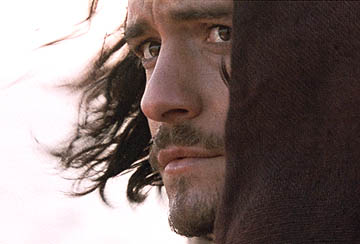 Well, I don’t think being feverish at the time helped by any means — still, Ridley Scott’s Kingdom of Heaven is, well, kinda blah. It’s got its heart in the right place, and I’d say I was mildly diverted by it for the first 75 minutes or so, but after that I was just waiting for it to be over. In terms of recent sword-and-sandal and/or historical siege pics, I’d say it’s better than King Arthur or the woeful Alexander, but probably on a par with Troy or The Alamo.
Well, I don’t think being feverish at the time helped by any means — still, Ridley Scott’s Kingdom of Heaven is, well, kinda blah. It’s got its heart in the right place, and I’d say I was mildly diverted by it for the first 75 minutes or so, but after that I was just waiting for it to be over. In terms of recent sword-and-sandal and/or historical siege pics, I’d say it’s better than King Arthur or the woeful Alexander, but probably on a par with Troy or The Alamo.
Put very bluntly, the gist is this: Legolas (Orlando Bloom) is an ornery, grieving blacksmith somewhere in France who, after a visitation from a world-weary crusader, Lord Qui-Gon (Liam Neeson, playing yet another expository mentor/dead-duck), and his hospitaler, Prof. Lupin (David Thewlis), decides to embark to the Holy Land to seek Christ’s forgiveness for the suicide of his wife. Along the way, he makes a Muslim friend in Dr. Bashir (Alexander Siddig) and a Christian enemy in Celeborn (Marton Csoskas), and discovers that zealots are generally rather unlikable people on both sides of the religious divide. Upon arriving in Jerusalem, Legolas is feted at the court of leper King Tyler Durden (a masked Edward Norton), whereupon he makes more friends (Jeremy Irons, Eva Green) and enemies (Brendan Gleeson, hamming it up like a community-theater Brian Cox), all before an interminably long siege against the forces of Saladin (a charismatic Ghassan Massoud.)
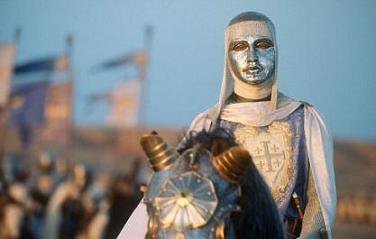 Are all those fanboy comparisons unfair? Well, not after sitting through the last hour, which basically played like Helms Deep and Minas Tirith all over again. Yes, the production values are immaculate and all the (fetishized) weaponry is used in suitably historic fashion, but, really, how many historic sieges can one be expected to sit through in a given couple of years? Frankly, Kingdom of Heaven was more interesting in the early going, when there was more acting amid the fighting.
Are all those fanboy comparisons unfair? Well, not after sitting through the last hour, which basically played like Helms Deep and Minas Tirith all over again. Yes, the production values are immaculate and all the (fetishized) weaponry is used in suitably historic fashion, but, really, how many historic sieges can one be expected to sit through in a given couple of years? Frankly, Kingdom of Heaven was more interesting in the early going, when there was more acting amid the fighting.
As for the politics, well…the message of the film — religion good, religious zealots bad — is laudable and well-worth hearing these days, perhaps even brave. But, while confessing a near-total ignorance of medieval history, Kingdom of Heaven sure doesn’t seem very historical in its 21st century forward-mindedness. At one point before the siege, Legolas not only makes the case for religious tolerance but completely dismantles the feudal caste system — I was almost waiting for him to institute the ballot box and universal public education while he was at it.
In short, even though I’m in sympathy with the general pluralist worldview of Kingdom of Heaven, the movie could have definitely done with less anachronistic liberal humanism and more dramatic complexity. (In fact, I can’t think of a single character in the film who displayed more than one dimension.) And, even notwithstanding the history, there just needed to be more characterization and less CGI-battling here. As both an historical epic and a summer popcorn film, Kingdom of Heaven felt only a step or two above Purgatory.

